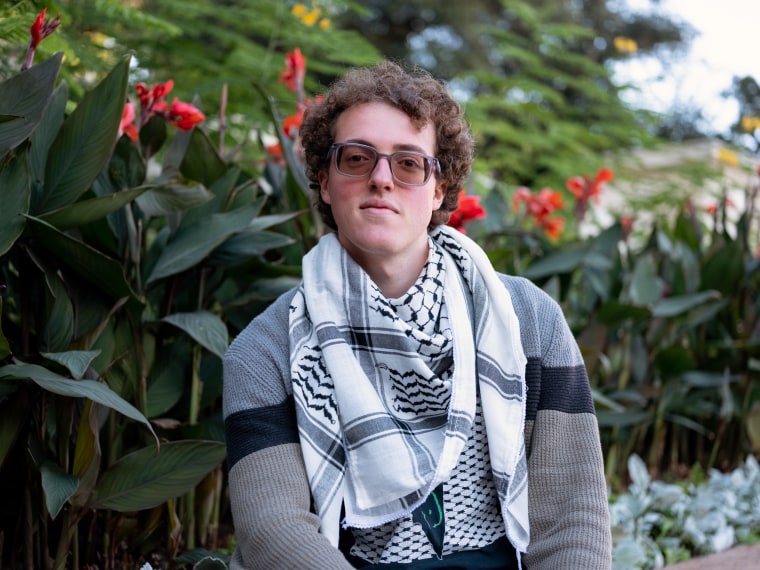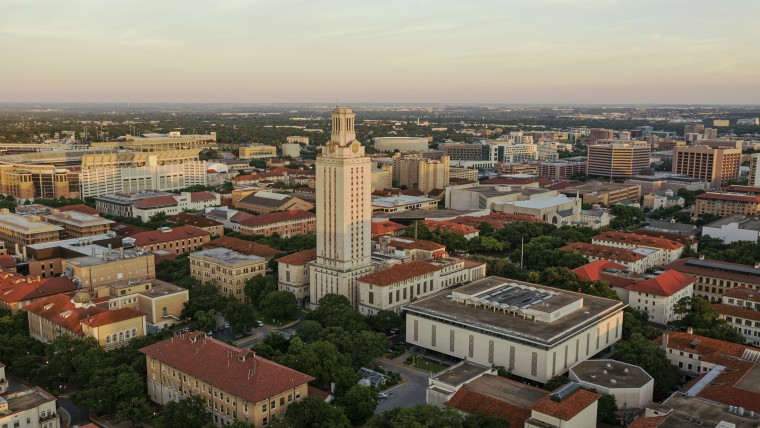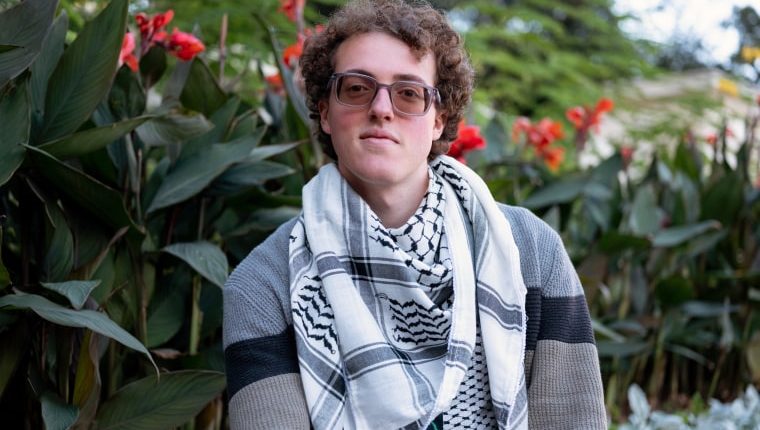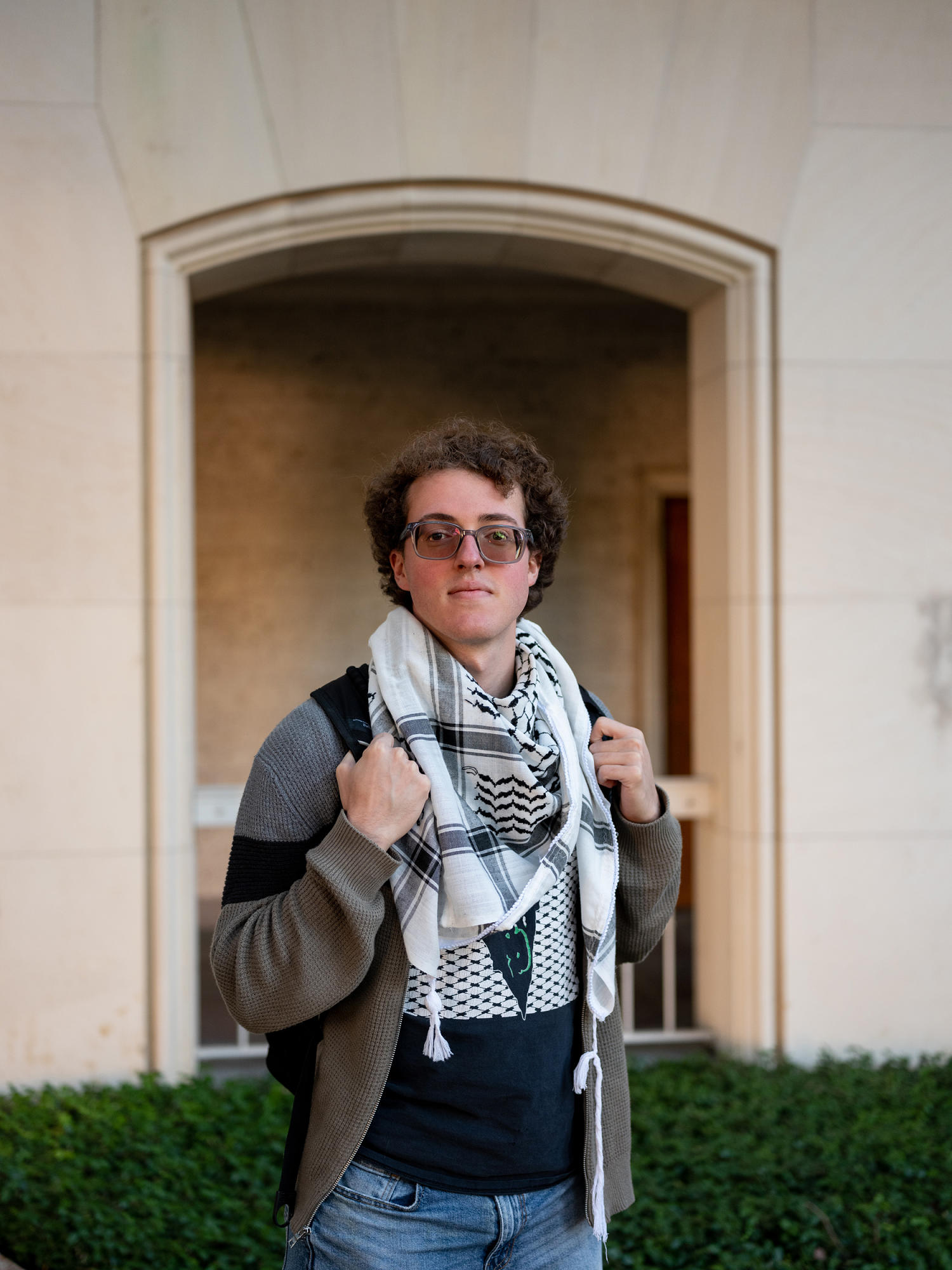The first hint of trouble came via Instagram. On the evening of Oct. 12, a terse message landed in the inbox of the Palestine Solidarity Committee, a student organization at the University of Texas at Austin, shortly before the start of one of its events.
“See you there, you f—–g terrorist,” it read.
The message didn’t faze the student leaders of the Palestine Solidarity Committee, or PSC. They knew their political positions made them a lightning rod on campus, and even more so in the wake of the Hamas attack that killed 1,200 people in Israel, according to government figures.
But about an hour into the event — “Palestine 101, a rundown on Palestinian history, resistance and current context” — three men showed up outside the campus lecture hall where it was taking place.
They got in the faces of the student organizers, and one of the men repeatedly called them “f—–g terrorists,” according to cellphone video of the encounter.
The men said they were not there to cause violence. But as more students pulled out their phones, the taunts from the most vocal of the three took a more menacing turn.
“You can also film next week I’m in Israel, we’re killing f—–g Arabs, motherf—–s,” the man said, implying that he was a member of the Israeli army.
Shortly afterward, one of his cohorts boasted that he was a soldier in the Israeli military.
The confrontation lasted more than three minutes. At no point did the men become violent, but the students had to hold the door shut as one of them attempted to get into the room.
When the three men finally began to walk away, they threw onto the floor posters they had brought about kidnapped Israeli children. They also confronted students in the hallway who were cramming for a chemistry exam and had no involvement in the event.
“They were looking for a problem,” said Ammer Qaddumi, a Palestinian American member of the Palestine Solidarity Committee in his third year at UT. “But we didn’t engage with them the way they wanted us to.”
The Oct. 7 attack in Israel and its retaliatory strikes in Gaza have spurred a spate of antisemitic and Islamophobic incidents across the U.S. Tensions have run particularly high on college campuses, with acts of hate and violence at places like Cornell University, Harvard and Stanford generating national headlines.
But the situation at the University of Texas has drawn comparatively less attention. That, Muslim students and community leaders say, is no surprise.

They believe that the incident has laid bare a double standard that exists in how the university responds to acts of hate. The Muslim students and leaders point to the fact that the three provocateurs have faced no repercussions, and the university has not directly addressed the incident in any public statements or forums.
When swastikas were found spray painted outside a Jewish sorority house in September, the university immediately released a statement condemning the incident and the campus police department increased patrols in the area.
“Palestinian students on this campus, frankly, are seen as a footnote,” said Adam, 21, a senior who is part Palestinian and who asked to be identified only by his first name due to fears of being harassed. “We’re never seen equally to our Jewish counterparts. I think nothing made that more clear than what happened on Oct. 12.”
A UT spokesperson said in a statement that “university administrators have continuously engaged groups and individuals most impacted by the horrific events in the Middle East to ensure their physical and emotional wellbeing.”
“The confrontation that occurred outside of the Palestine Solidarity Committee’s event is not acceptable and upon learning about it, we immediately engaged the UT Police Department to investigate and contacted PSC to offer support,” the statement added.
The UT Police Department also released a statement.
“Our preliminary investigation suggests that those engaged were not affiliated with the University and therefore could be subject to a criminal trespass violation,” the department said. “They have not been positively identified and the investigation is ongoing.”
That the investigation is active came as a surprise to the Palestine Solidarity Committee members.
The university previously told local news outlet KXAN that its police department “looked into the matter and found no criminal offense.”
But the students say what is even more baffling is the campus police’s new assertion that it hasn’t identified the men. The students said they had no trouble tracking down social media accounts for two of them. The students said they even gave the police the two men’s names and account information.
“I don’t know how much further we can go in doing their work for them,” said the student named Adam.
NBC News found that the men who disrupted the event, or at least one of them, are not difficult to reach.
Last week, NBC News sent a message via Facebook to the man who called the students terrorists. And exactly 20 minutes later, he responded.
A ‘deafening’ silence
The shocking Hamas attack put UT in a difficult spot.
The university has an official policy not to make public statements about “major societal events and matters of general public interest” except when they have a “unique impact” on members of the UT community.

But on the day after the three men berated the students, UT President Jay Hartzell released a statement that was closely read on campus. It referenced the “horrors” of the previous week but did not mention Israel, Hamas or Gaza.
Hartzell did, however, note that the university had increased security patrols around “areas of heightened sensitivity, including UT’s Jewish sorority and fraternities, Texas Hillel, and other communities.” Hartzell also said that he had shared a message with the Texas Hillel’s rabbi.
Anwer Imam, the director of religious affairs at the Nueces Mosque, located two blocks from campus, said what stood out to him about the statement was what it didn’t say.
Anything about Palestinian or Muslim students. Anything about the incident that took place at the Palestine Solidarity Committee event the previous day.
“He made sure to mention that he called the local rabbi to lend his support and his condolences,” Imam said. “These are all things that we wish he would offer us.”
Source: | This article originally belongs to Nbcnews.com










